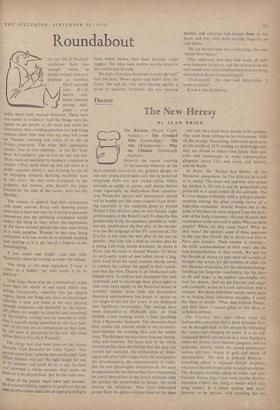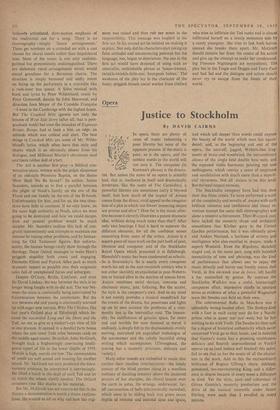The atre The New Heresy
By ALAN BRIEN The Kitchen. (Royal Court, Sunday.) -- The Crooked Mile. (Cambridge.) — The Ark. (Westminster.) — Why the Chicken. (Edinburgh -Festival.)
DESPITE the recent roasting of - Savonarola Osborne at his do-it-yoUrself auto-da-fe, the greatest danger. to our new young playwrights now lies in hysterical overpraise from our new young critics. Glory corrupts as surely as power, and drama thrives more vigorously on martyrdom than canonisa- tion. Words like 'genius' and 'masterpiece' should not be handed out like soap coupons. I am think- ing especially of the reception given to Arnold Wesker's The Kitchen after its two Sunday night performances at the Royal Court. To describe this ponderously lively documentary parable as 'with- out any qualification the best play of the decade' is to use the language of the TV commercial. The Kitchen is not even the best play of the last six months—that tiny title is held by another play by a young Left-wing Jewish dramatist. Its name is Roots and his name is Arnold Wesker. To boost an early-early work of new talent above a latic 'early work'from the same cranium merely serves to confirm the critical old guard in their convic- tion that the New 'Theatre is an intellectual con- fidence trick, to. confuse and disappoint the cash customers, and to encourage these playwrights to stick even more rigidly to the theatrical heresy of symbolic realism. Some fresh and provocative theatrical entertainment has begun to sprout on our stages in the last few years. It has displayed two significant innovations. The settings have been unfamiliar—a Midlands attic, an Irish brothel,. a new housing estate, a Soho gambling shop, a Bayswater basement. The characters have been misfits and outcasts exiled in the no-man's- land between the working class and the middle class. 'The dialogue has also been eloquent, bawdy, witty and concrete. The basic kick of the whole movement has been the feeling that the play was written last weekend, the exhilaration of listen- ing to talk alive with images from the newspapers, the advertisements, the entertainments of today.
But the new playwrights themselves do not seem to appreciate the revolution they have engineered, the joyful destruction of the french windows onto the garden, the stockbroker in Sussex, the maid dusting the telephone. They have kidnapped people from the gallery and put them on the stage --but now they want those people to be symbols, they want those settings to be microcosms. With all the strange, fascinating, individual particulars of this world of 1959 sticking to their finger-tips, they are driven to distort and falsify their por- traits and streetscapes to make commonplace allegories about Life, and Love, and Society, and the Bomb. •
In Roots, Mr. Wesker had thrown off this Messianic compulsion, In The Kitchen he is still at its mercy. The more real and true and unique his kitchen is, the less it can be generalised and projected as a scale model of the universe. The Kitchen beginS brilliantly with a polyglot pande- monium among the great roaring stoves of a high-class restaurant. Arnold Wesker has in the_ palm of his hand an atom snipped from the back- side of the body economic—the sort of atom that is unknown to the rest until it splits. Who are these people? Where do they come from? What do they want? He answers some of these questions in the way that Orwell did in Down and Out in Paris and London. Their routine is riveting-- the brisk somnambulism of their work and the lazy somnambulism of their words. We wait for the threads of drama to start their cat's-cradle of thought and action, for the moment of crisis, for the dilemma of decision, for the unknown feelings fumbling for forgotten vocabulary, for the floor to tilt and shake at the sudden catastrophe. We wait for drama. And we get humour and anger and eventually action as a cook runs amok with a chopper. But those individual people never seem to he feeling those individual thoughts. I could like them as people. When they became People, and then Ideas, I ceased either to like them or to believe inthem.
The Crooked Mile also suffers from the fashionable conviction that a dead dramatic form can be brought back to life simply by redressing the corpse and changing its name. It is an old- fashioned British operetta set in a slum Ruritania where the princes have become gangsters and the princesses whores, while the quaint picturesque natives still have brains of gold and hearts of marshmallow. The plot is debased Runyon— something about a coloured female shoplifter who has to become respectable to adopt an orphan. The dialogue stumbles along on weak, sad puns ('nuclear fission chips') and weak jocular doubie- entendres ('that's one thing a whore won't take lying down'). It is never spoken, and never deserves to be spoken, with anything but the hollowly articulated, slow-motion emphasis of the traditional cue for a song. There is no choreography—simply 'dance arrangements.' These get nowhere on a crowded set with a cast chosen for choral tonsils rather than terpsichoral toes. Most of the music is not only undistin- guished but pretentiously undistinguished. There are elaborate vocal arrangements which would sound grandiose for a Bernstein chorus. The direction is simply bemused and oddly intent on lining up the performers in a crocodile like a rush-hour bus queue. A Soho musical with book and lyrics by Peter Wildeblood, music by Peter Greenwell, dances by John Heawood, and direction Jean Meyer of the Comedie Francaise —I went to the Cambridge with the highest hopes. But The Crooked Mile ignores not only the lessons of West Side Story (after all, that is post- graduate work) but even the mistakes of Expresso Bongo. Bongo had at least a bite, an edge, an attitude which was critical and alert. The best things in Crooked Mile are some of Mr. Wilde- blood's lyrics, which often have that style and charm which is so obviously absent from his dialogue, and Millicent Martin's chromium steel and foam rubber doll of a tart.
The Ark is another first play—a Biblical con- versation-piece, written with the pulpit eloquence of an old-style Primitive Baptist, on the theme 'How Shall We Be Saved?' Its author, James Saunders, intends us to find a parallel between the plight of Noah's family on the eve of the Flood and our family on the eve of the H-bomb. Unfortunately for him, and for us, the two situa- tions have little in common. If we only knew, on the same high authority as Noah, when we were going to be destroyed and how we could escape, then our present problem would be much simpler. Mr. Saunders realises this lack of con- gruity intermittently and attempts to maintain our interest by raising other problems, and by human- ising his Old Testament figures. But unfortu- nately, the human beings rarely show through the theology. Oscar Quitak manages to make Ham's priggish stupidity both comic and engaging. Denholm Elliott and Patrick Allen pack as much dramatic impact as possible into their enigmatic roles full of unexplained furies and lethargies.
Despite O'Casey, Bridie, Linklater, and even Sir David Lindsay, the war between the sects is no longer being fought with its old zeal. The war bet- ween the sexes is continually being interrupted by fraternisation between the combatants. But the war between old and young is continually warmed up with eager new recruits. Why The Chicken, like last year's Oxford play at Edinburgh which be- came the successful Long and the Short and the Tall, set out to give us a ranker's-eye view of life in one platoon. It opened in a derelict farm house where the new-town Teds relax between raids on the middle-aged enemy. Its author, John McGrath, brought back a frighteningly convincing intelli- gence report of life in the lower depths of 1959. Morale is high, morals are low. The commandoes of youth are well armed and massing for another attack. Mr. McGrath not only presented the docu- mentary evidence, he interpreted it convincingly. He lifted a hatch in the skull of each Ted and let us watch the wheels slowly revolve. The Oxford amateurs rose like sharks to his material.
But Mr. McGrath was not convinced that in the theatre a demonstration is worth a dozen explana- lions. He wanted to tell us why and how this regi- ment was raised and then rub our noses in the responsibility. This message was implicit in his first act. In his second act he insisted on making it explicit. Not only did his characters start taking up false attitudes and unconvincing postures but the language, too, began to deteriorate. No one in the first act would have dreamed of using such an unsayable, unthinkable phrase as 'house-trained, twinkle-twinkle-little-star, bourgeois babies.' The weakness of the play lay in the character of the busty, priggish female social worker from Oxford who tries to infiltrate the Ted ranks and is almost infiltrated herself on a lonely mountain side by a randy youngster. She tries to link both halves, instead she breaks them apart. Mr. McGrath should remove her from the centre of his action and give up the attempt to make her condescend- ing Florence Nightingale act sympathetic. The play lies in the Tingie and Doggie and Fairy-Face and Sad Sid and the dialogue and action should never try to escape from the limits of their world.











































 Previous page
Previous page